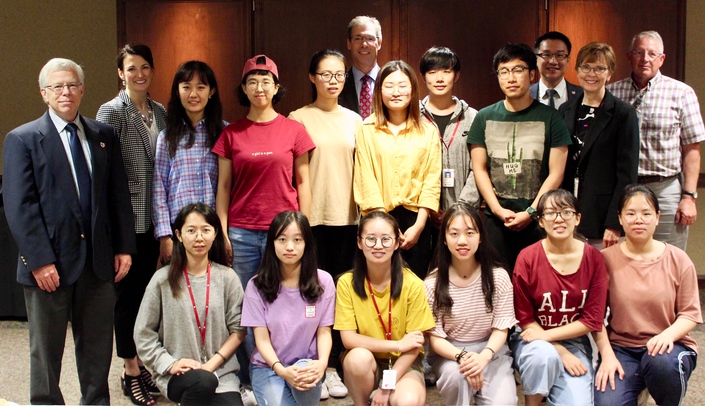Robotic assisted treadmills. Virtual reality balance assessments. Aquatic exercise programs.
Twelve trainees from Beijing and Chengdu saw the latest technology in rehabilitation therapy during a three-week program at UNMC. The trainees were part of the second cohort of the Summer Physical Therapy Education for Chinese Students Program (SPECS) jointly hosted by the College of Allied Health Professions and the Asia Pacific Rim Development Program (APRDP). The 12 undergraduate students are in rehabilitation programs from Capital Medical University in Beijing and Sichuan University in Chengdu.
Rehabilitation in China is growing in recognition and popularity. The Chinese government has required all newly established hospitals to have rehabilitation departments in order for them to receive a high ranking.
Physical therapy education also is emerging in China as more medical universities are developing rehabilitation programs. The SPECS program provides participants with an introduction to physical therapy sciences and practice in the U.S., experience in cutting-edge research and clinical facilities, and an international vision that will enable them to take leadership roles and aid in the growth of rehabilitation in China.
"The SPECS program offers physical therapy students from China a unique, firsthand exposure to the physical therapy profession in the U.S., including clinical care and research," said Kyle Meyer, Ph.D., dean of the College of Allied Health Professions. "It represents an important component of a wonderful international collaboration to prepare leaders to advance physical therapy education and practice in China."
SPECS students were on campus from July 23 to Aug. 10. They took classes from faculty in the College of Allied Health Professions, experienced rehabilitation research at facilities at UNMC and UNO, observed treatment at clinical sites in Omaha and Lincoln, enjoyed living at UNO's Scott Village, danced at Jazz on the Green, shopped at Nebraska Crossing, and toured the Henry Doorly Zoo.
"With support from UNMC leadership, CAHP administration, PT faculty and staff, APRDP and the five clinical sites, we were able to continue the unique and successful SPECS program to a group of PT students from China," said Joseph Siu, Ph.D., global director of the Chinese MS-DPT program and a faculty member of physical therapy education in the College of Allied Health Professions. "Two years in a row! We received positive feedback from the students. I believe the success of this program will attract more Chinese students to come to UNMC and learn about DPT."
